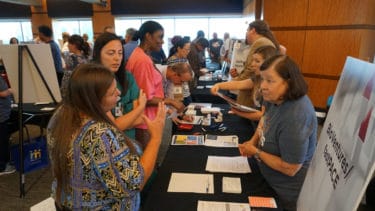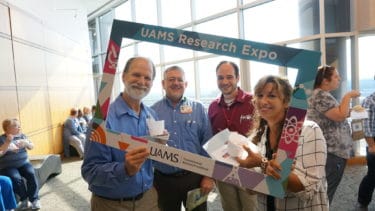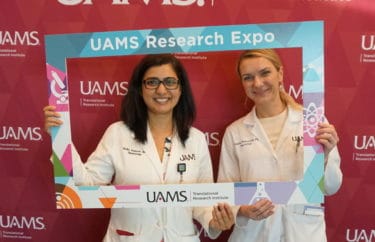The UAMS Research Expo was a new experience for Yuet-Kin “Ricky” Leung, Ph.D., and one that will help get his research on solid footing as a new faculty member.

“I’ve never seen this kind of expo before, and it’s very helpful for me,” said Leung, an associate professor in the College of Medicine Department of Pharmacology and Toxicology. “I had no clue before how many units or service groups were available to help me.”
Leung, along with about 150 other UAMS faculty and research staff, stopped by the Jackson T. Stephens Spine & Neurosciences Institute to check out the 30-plus research services represented at the Sept. 10 Research Expo.
This year’s Expo marked an expansion of the Translational Research Institute (TRI) Open Houses held the past two years. TRI and the UAMS Office of Research Compliance co-sponsored the event, inviting all UAMS-wide research service providers as well as its partners, Arkansas Children’s Research Institute (ACRI) and the Central Arkansas Veterans Healthcare System.
The Expo is a fun, relaxed way for researchers to talk directly to the research service providers all in one place. This year’s event also included ice cream, hors d’oeuvres and door prizes drawn by Stephanie Gardner, Ed.D., UAMS provost and chief strategy officer.

Gardner also welcomed attendees, noting that the Expo helps researchers find critical resources that will help them get their studies off the ground more quickly and produce high quality findings.
Nidhi Kapoor, M.D., assistant professor in the College of Medicine Department of Neurology, is already familiar with many of TRI’s research services, she said, but the event made her aware of additional research amenities. “Every time I go to one of these meetings, whether it’s the Research Expo or the faculty resource fair last month, I tend to learn something new. I meet more people, and I learn about new resources and more help that’s available to busy clinicians like me.”
New this time for her, Kapoor said, was TRI’s Implementation Science Scholars program, which is accepting applications through Sept. 20. “I am considering submitting an application,” she said.

She also gleaned other valuable information, such as protocol building services with the Institutional Review Board, and how the Office of Research & Sponsored Programs can help with her with future grant applications.
Jami Jones, research program director at the Center for Childhood Obesity Prevention, was finding some promising new connections for her center’s researchers based at ACRI.
“I’ve been visiting booths looking for ways that our researchers can utilize the various services offered through UAMS,” Jones said. “I think that both ACRI and UAMS offer great support for research and it was exciting to learn about new resources and opportunities for collaboration. It was very interesting to learn about the data warehouse (Arkansas Clinical Data Repository – AR-CDR); I didn’t know about it, and I think we can utilize that.”
She also discovered exciting possibilities in her visit with the Institute for Digital Health & Innovation booth. She said researchers at ACRI are

interested in using mobile applications in their studies but app developers are lacking. The institute, she learned, is working on finding app developers. “I’m very excited about that,” Jones said.
Chenghui Li, Ph.D., an associate professor in the College of Pharmacy Department of Pharmaceutical Evaluation and Policy i, said having all the services in one place helped her clarify what each p rogram does.
“I just didn’t realize how many different services were part of the research enterprise; I knew some of them,” Li said, who is new to UAMS.
Li found assistance from TRI’s Clinical Trials Innovation Unit.
“I actually have a specific project that I needed information for, and they were very helpful,” she said. “They also provided individuals’ names for further contact. Gary D. Lewis, M.D., a new assistant professor in the College of Medicine Department of Radiation Oncology, enjoyed the whole Expo experience.
“I thought it was great as a new faculty member to learn and meet all these people who I’m going to be working with, and to figure out what resources are available,” Lewis said. “Since I am new here, I just wanted to try to make sense of all the resources that are available.”
While he is still plotting his research path, he sees promise in TRI’s ARresearch participant registry, its Community Engagement program and the resources available at the Institute for Digital Health & Innovation.
